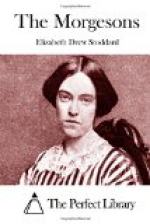Ben and I visited his father, who asked questions relative to the temperature, the water, and the dietetic qualities of Surrey. He was affable, but there was no nearness in his affability. He skated on the ice of appearances, and that was his vocation in his family. He fulfilled it well, but it was a strain sometimes. His family broke the ice now and then, which must have made him plunge into the depths of reality. I learned to respect his courage, bad as his cause was. Marrying Bellevue Pickersgill for her money, he married his master, and was endowed only with the privilege of settling her taxes. Simon Pickersgill, her father, tied up the main part of his money for his grandchildren. It was to be divided among them when the youngest son should arrive at the age of twenty-one—an event which took place, I supposed, while Ben was on his way to India. Desmond and an older son, who resided anywhere except at home, made havoc with the income. As the principal prospectively was theirs, or nearly the whole of it, why should they not dispose of that?
At last Mr. Somers looked at his watch, a gentle reminder that it was time for us to withdraw. Adelaide was still in the parlor, lying on her favorite sofa contemplating the ceiling. I asked permission to retire, which she granted without removing her regards. In spite of my sound sleep that night, I was started from it by the wail of a young child. The strangeness of the chamber, and the continued crying, which I could not locate, kept me awake at intervals till dawn peeped through the curtains.
CHAPTER XXVIII.
A few days after my arrival, some friends dined with Mrs. Somers. The daughters of a senator, as Ann informed me, and an ex-governor, or I should not have known this fact, for I was not introduced. The dinner was elaborate, and Desmond did the honors. With the walnuts one of the ladies asked for the baby.
Mrs. Somers made a sign to Desmond, who pulled the bell-rope—mildly this time. An elderly woman instantly appeared with a child a few months old, puny and anxious-looking. Mrs. Somers took it from her, and placed it on the table; it tottered and nodded to the chirrups of the guests. Ben, from the opposite side of the table, addressed me by a look, which enlightened me. His voyage to India was useless, as the property would stand for twenty-one years more, lacking some months, unless Providence interposed. Adelaide was oblivious of the child, but Desmond thumped his glass on the mahogany to attract it, for its energies were absorbed in swallowing its fists and fretfully crying. When Murphy announced coffee in the parlor, the nurse took it away; and after coffee and sponge cake were served the visitors drove off. That afternoon some friends of Adelaide called, to whom she introduced me as “cousin.” She gave graphic descriptions of them, after their departure. One had achieved greatness by spending her winters in Washington, and contracting a friendship with John C. Calhoun. Another was an artist who had painted an ideal head of her ancestor, Sir Roger de Roger, not he who had arrived some years ago as a weaver from Glasgow, but the one who had remained on the family estate. A third reviewed books and collected autographs.




